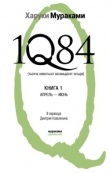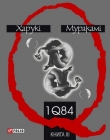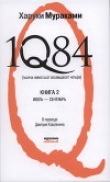
Текст книги "1q84"
Автор книги: Haruki Murakami
Жанр:
Современная проза
сообщить о нарушении
Текущая страница: 40 (всего у книги 81 страниц)
“Sure,” Tengo said, “but I can’t think of a good book for reading out loud. I don’t have the book here, but I can tell you a story called ‘Town of Cats,’ if you like.”
“ ‘Town of Cats.’ ”
“It’s the story of a town ruled by cats.”
“I want to hear it.”
“It might be a little too scary for a bedtime story, though.”
“That’s okay. I can sleep, whatever story you tell.”
Tengo brought a chair next to the bed, sat down, folded his hands in his lap, and started telling “Town of Cats,” with the thunder as background music. He had read the story twice on the express train and once again, aloud, to his father in the sanatorium, so he knew the plot pretty well. It was not such a complex or finely delineated story, nor had it been written in a terribly elegant style, so he felt little hesitation in altering it as he pleased, omitting the more tedious parts or adding episodes that occurred to him as he recited the story for Fuka-Eri.
The original story had not been very long, but telling it took a lot longer than he had imagined because Fuka-Eri would not hesitate to ask any questions that occurred to her. Tengo would interrupt the story each time and give her careful answers, explaining the details of the town or the cats’ behavior or the protagonist’s character. When they were things not described in the story (which was usually the case), Tengo would make them up, as he had with Air Chrysalis. Fuka-Eri seemed to be completely drawn in by “Town of Cats.” She no longer looked tired. She would close her eyes sometimes, imagining scenes of the town of cats. Then she would open her eyes and urge Tengo to go on with the story.
When he was through telling her the story, Fuka-Eri opened her eyes wide and stared at Tengo the way a cat widens its pupils to stare at something in the dark.
“Did you go to a town of cats,” Fuka-Eri asked Tengo, as if pressing him to reveal a truth.
“Me?!”
“You went to your town of cats. Then came back on a train.”
“Is that what you feel?”
With the summer quilt pulled up to her chin, Fuka-Eri gave him a quick little nod.
“You’re quite right,” Tengo said. “I went to a town of cats and came back on a train.”
“Did you do a purification afterward,” she asked.
“Purification? No, I don’t think so, not yet.”
“You have to do it.”
“What kind of purification?”
Instead of answering him, Fuka-Eri said, “If you go to a town of cats and don’t do anything about it afterward, bad stuff can happen.”
A great thunderclap seemed to crack the heavens in two. The sound was increasing in ferocity. Fuka-Eri recoiled from it in bed.
“Come here and hold me,” Fuka-Eri said. “We have to go to a town of cats together.”
“Why?”
“The Little People might find the entrance.”
“Because I haven’t done a purification?”
“Because the two of us are one,” the girl said.
CHAPTER 13
Aomame
WITHOUT YOUR LOVE
“1Q84,” Aomame said. “Are you talking about the fact that I am living now in the year called 1Q84, not the real 1984?”
“What the real world is: that is a very difficult problem,” the man called Leader said as he lay on his stomach. “What it is, is a metaphysical proposition. But this is the real world, there is no doubt about that. The pain one feels in this world is real pain. Deaths caused in this world are real deaths. Blood shed in this world is real blood. This is no imitation world, no imaginary world, no metaphysical world. I guarantee you that. But this is not the 1984 you know.”
“Like a parallel world?”
The man’s shoulders trembled with laughter. “You’ve been reading too much science fiction. No, this is no parallel world. You don’t have 1984 over there and 1Q84 branching off over here and the two worlds running along parallel tracks. The year 1984 no longer exists anywhere. For you and for me, the only time that exists anymore is this year of 1Q84.”
“We have entered into its time flow once and for all.”
“Exactly. We have entered into this place where we are now. Or the time flow has entered us once and for all. And as far as I understand it, the door only opens in one direction. There is no way back.”
“I suppose it happened when I climbed down the Metropolitan Expressway’s emergency stairway.”
“Metropolitan Expressway?”
“Near Sangenjaya,” Aomame said.
“The place is irrelevant,” the man said. “For you, it was Sangenjaya. But the specific place is not the question. The question here, in the end, is the time. The track, as it were, was switched there, and the world was transformed into 1Q84.”
Aomame imagined a number of Little People joining forces to move the device that switches the tracks. In the middle of the night. Under the pale light of the moon.
“And in this year of 1Q84, there are two moons in the sky, aren’t there?”
“Correct: two moons. That is the sign that the track has been switched. That is how you can tell the two worlds apart. Not that all of the people here can see two moons. In fact, most people are not aware of it. In other words, the number of people who know that this is 1Q84 is quite limited.”
“Most people in this world are not aware that the time flow has been switched?”
“Correct. To most people, this is just the plain old everyday world they’ve always known. This is what I mean when I say, ‘This is the real world.’ ”
“So the track has been switched,” Aomame said. “If it had not been switched, we would not be meeting here like this. Could that be what you are saying?”
“That is the one thing that no one knows. It’s a question of probability. But that is probably the case.”
“Is what you are saying an objective fact, or just a hypothesis?”
“Good question. But distinguishing between the two is virtually impossible. Remember how the old song goes, ‘Without your love, it’s a honky-tonk parade’?” He hummed the melody. “Do you know it?”
“ ‘It’s Only a Paper Moon.’ ”
“That’s it. 1984 and 1Q84 are fundamentally the same in terms of how they work. If you don’t believe in the world, and if there is no love in it, then everything is phony. No matter which world we are talking about, no matter what kind of world we are talking about, the line separating fact from hypothesis is practically invisible to the eye. It can only be seen with the inner eye, the eye of the mind.”
“Who switched the tracks?”
“Who switched the tracks? That is another difficult question. The logic of cause and effect has little power here.”
“In any case, some kind of will transported me into this world of 1Q84,” Aomame said. “A will other than my own.”
“That is true. You were carried into this world when the train you were on had its tracks switched.”
“Do the Little People have anything to do with that?”
“In this world there are the so-called Little People. Or at least, that is what they are called in this world. But they do not always have a shape or a name.”
Aomame bit her lip in thought. Then she said, “What you are saying sounds contradictory to me. Let’s assume it was these ‘Little People’ who switched the track and carried me into this world of 1Q84. Why would they do such a thing if they don’t want me to do what I am about to do to you? It would be far more advantageous to get rid of me.”
“That is not easy to explain,” the man said, his voice lacking all intonation. “But you are a very quick thinker. You might be able to grasp, however vaguely, what I am trying to tell you. As I said before, the most important thing with regard to this world in which we live is for there to be a balance maintained between good and evil. The so-called Little People—or some kind of manifestations of will—certainly do have great power. But the more they use their power, the more another power automatically arises to resist it. In that way, the world maintains a delicate balance. This fundamental principle is the same in any world. Precisely the same thing can be said in this world of 1Q84 that now contains us. When the Little People began to manifest their enormous power, a power opposing the Little People also automatically came into being. And this opposing momentum must have drawn you into the year 1Q84.”
Lying like a beached whale on his blue yoga mat, the giant man released a huge breath.
“To continue with the train analogy: it is possible for them to switch tracks, as a result of which the train has entered its current line—the 1Q84 line. One thing they are not able to do, however, is to distinguish one passenger on the train from another—to choose among them. Which means that there may be passengers aboard who, to them, are undesirable.”
“Uninvited passengers.”
“Exactly.”
Again there was a rumble of thunder. This one was much louder than before. But there was no lightning. Just the sound. Strange, Aomame thought. The thunder is so close, but the lightning doesn’t flash. And no rain is falling.
“Have I managed to make myself clear thus far?”
“I’m listening,” she said, having already moved the needle away from the spot on his neck. Now she had it pointed cautiously toward empty space. She had to concentrate all her attention on what he was saying.
Where there is light, there must be shadow, and where there is shadow there must be light. There is no shadow without light and no light without shadow. Karl Jung said this about ‘the Shadow’ in one of his books: ‘It is as evil as we are positive … the more desperately we try to be good and wonderful and perfect, the more the Shadow develops a definite will to be black and evil and destructive.… The fact is that if one tries beyond one’s capacity to be perfect, the Shadow descends to hell and becomes the devil. For it is just as sinful from the standpoint of nature and of truth to be above oneself as to be below oneself.’
“We do not know if the so-called Little People are good or evil. This is, in a sense, something that surpasses our understanding and our definitions. We have lived with them since long, long ago—from a time before good and evil even existed, when people’s minds were still benighted. But the important thing is that, whether they are good or evil, light or shadow, whenever they begin to exert their power, a compensatory force comes into being. In my case, when I became an ‘agent’ of the so-called Little People, my daughter became something like an agent for those forces opposed to the Little People. In this way, the balance was maintained.”
“Your daughter?”
“Yes, the first one to usher in the so-called Little People was my daughter. She was ten years old at the time. Now she is seventeen. The Little People emerged from the darkness at some point, coming here through her, and they made me their agent. My daughter became a Perceiver and I became a Receiver. Apparently we were suited to such roles by nature. In any case, they found us. We did not find them.”
“And so you raped your own daughter.”
“I had congress with her,” he said. “That expression is closer to the truth. And the one I had congress with was, strictly speaking, my daughter as a concept. ‘To have congress with’ is an ambiguous term. The essential point was for us to become one—as Perceiver and Receiver.”
Aomame shook her head. “I can’t understand what you are saying. Did you have sex with your daughter or didn’t you?”
“The answer to that question is, finally, both yes and no.”
“Is this true of little Tsubasa as well?”
“Yes, in principle.”
“But Tsubasa’s uterus was destroyed—not ‘in principle’ but in reality.”
The man shook his head. “What you saw was the outward manifestation of a concept, not an actual substance.”
Aomame was unable to follow the swift flow of the conversation. She paused to bring her breathing under control. Then she asked, “Are you saying that a concept took on human shape and ran away on its own two feet?”
“To put it simply.”
“The Tsubasa I laid eyes on was not actual substance?”
“Which is why she was retrieved.”
“Retrieved,” Aomame said.
“She was retrieved and is now being healed. She is receiving the treatment she needs.”
“I don’t believe you,” Aomame declared.
“I can’t blame you,” the man said without emotion.
Aomame was at a loss to say anything for a time. Then she asked another question. “By violating your daughter, conceptually and ambiguously, you became an agent of the Little People. But simultaneously, your daughter compensated by leaving you and becoming, as it were, an opponent of the Little People. Is this what you are asserting?”
“That is correct. And in order to do so, she had to leave her own dohta behind,” the man said. “That doesn’t mean anything to you, though, does it?”
“ ‘Dohta’?” Aomame asked.
“Something like a living shadow. Here another character becomes involved—an old friend of mine. A man I can trust. I put my daughter in his care. Then, not too long ago, yet another character became involved, someone you know very well by the name of Tengo Kawana. Sheer chance brought Tengo and my daughter together as a team.”
Time seemed to come to a sudden halt. Aomame could find no words to speak. She went stiff from head to toe, waiting for time to begin to move once again.
The man continued speaking. “Each happened to have qualities that augmented the other. What Tengo lacked, Eriko possessed, and what Eriko lacked, Tengo possessed. They joined forces to complete a single work. And the fruits of their collaboration turned out to have a great impact. That is to say, in the context of establishing an opposition to the Little People.”
“They made a team?”
“Not that the two have a romantic or physical relationship. So there is nothing for you to worry about—if that is what you have in mind. Eriko will never have a romantic relationship with anyone. She has transcended such things.”
“What are the fruits of their collaboration, exactly?”
“In order to explain that, I must bring up a second analogy. The two have, so to speak, invented an antibody to a virus. If we take the actions of the Little People to be a virus, Tengo and Eriko have created and spread the antibody to combat it. This is, of course, a one-sided analogy. From the Little People’s point of view, Tengo and Eriko are, conversely, the carriers of a virus. All things are arranged as mirrors set face-to-face.”
“Is this what you call the compensatory function?”
“Exactly. In joining forces, the man you love and my daughter have succeeded in giving rise to such a function. Which is to say that, in this world, you and Tengo are literally in step with each other.”
“But that is not simply a matter of chance, according to you. You say I was led into this world by some form of will. Is that it?”
“That is it exactly. You came with a purpose, led by a form of will, to this world of 1Q84. That you and Tengo have come to have a relationship here—in whatever form it might take—is by no means a product of chance.”
“What kind of will, and what kind of purpose?”
“It has not been given to me to explain that, sorry to say,” the man said.
“Why are you unable to explain it?”
“It is not that the meaning cannot be explained. But there are certain meanings that are lost forever the moment they are explained in words.”
“All right, then, let me try another question,” Aomame said. “Why did I have to be the one?”
“You still don’t understand why, do you?”
Aomame gave her head several strong shakes. “No, I don’t understand why. Not at all.”
“It is very simple, actually. It is because you and Tengo were so powerfully drawn to each other.”
Aomame maintained a long silence. She sensed a hint of perspiration oozing from the pores of her face. It felt as if her whole face were covered by a thin membrane invisible to the naked eye.
“Drawn to each other,” she said.
“Yes, to each other. Very powerfully”
An emotion resembling anger welled up inside her as if from nowhere, accompanied by a vague sense of nausea. “I can’t believe that. He couldn’t possibly remember me.”
“No, Tengo knows very well that you exist in this world, and he wants you. To this day, he has never once loved any woman other than you.”
Aomame was momentarily at a loss for words, during which time the violent thunder continued at short intervals, and rain seemed to have finally begun to fall. Large raindrops began pelting the hotel room window, but the sound barely reached Aomame.
The man said, “You can believe it or not as you wish. But you would do better to believe it because it is the unmistakable truth.”
“You mean to say that he still remembers me even though twenty years have gone by since we last met? Even though we never really spoke to each other?”
“In that empty classroom, you strongly gripped his hand. When you were ten years old. You had to summon up every bit of your courage to do it.”
Aomame twisted her face out of shape. “How could you possibly know such a thing?”
The man did not answer her. “Tengo never forgot about that. And he has continued to think of you all this time. You would do well to believe it. I know many things. For example, I know that, even now, you think of Tengo when you masturbate. You picture him. I am right about that, aren’t I?”
Aomame let her mouth fall open slightly, but she was at a total loss for words. All she did was take one shallow breath after another.
The man went on, “It is nothing to be ashamed of. It is a natural human function. Tengo does the same thing. He thinks of you at those times, even now.”
“But how could you possibly …?”
“How could I possibly know such things? By listening closely. That is my job—to listen to the voices.”
She wanted to laugh out loud, and, simultaneously, she wanted to cry. But she could do neither. She could only stay transfixed, somewhere between the two, inclining her center of gravity in neither direction, at a loss for words.
“You need not be afraid,” the man said.
“Afraid?”
“You are afraid, just as the people of the Vatican were afraid to accept the Copernican theory. Not even they believed in the infallibility of the Ptolemaic theory. They were afraid of the new situation that would prevail if they accepted the Copernican theory. They were afraid of having to reorder their minds to accept it. Strictly speaking, the Catholic Church has still not publicly accepted the Copernican theory. You are like them. You are afraid of having to shed the armor with which you have long defended yourself.”
Aomame covered her face with her hands and let out several convulsive sobs. This was not what she wanted to do, but she was unable to stop herself. She would have preferred to appear to be laughing, but that was out of the question.
“You and Tengo were, so to speak, carried into this world on the same train,” the man said softly. “By teaming up with my daughter, Tengo took steps against the Little People, and you are trying to obliterate me for other reasons. In other words, each of you, in your own way, is doing something dangerous in a very dangerous place.”
“And you are saying that some kind of will wanted us to do these things?”
“Perhaps.”
“For what conceivable purpose?” No sooner had the question left her mouth than Aomame realized it was pointless. There was no hope she would ever receive a reply.
“The most welcome resolution would be for the two of you to meet somewhere and leave this world hand in hand,” the man said, without answering her question. “But that would not be an easy thing to do.”
“Not be an easy thing to do,” Aomame repeated his words unconsciously.
“Not an easy thing to do, and, sad to say, that is putting it as mildly as possible. In fact, it is just about impossible. The adversary that you two are facing, whatever you care to call it, is a fierce power.”
“So then—” Aomame said, her voice dry. She cleared her throat. By now she had overcome her confusion. This is no time to cry, she thought. “So then comes your proposition, is that it? I give you a painless death, in return for which you can give me something—a different choice.”
“You’re very quick on the uptake,” the man said, still lying facedown. “That is correct. My proposition is a choice having to do with you and Tengo. It may not be the most pleasant choice. But at least it does give you room to choose.”
. . .
“The Little People are afraid of losing me,” the man said. “They still need me. I am useful to them as their human agent. Finding my replacement will not be easy for them. And at this point in time, they have not prepared my successor. Many difficult conditions have to be met in order to become their agent, and I happen to meet all of them, which makes me a rare find. They are afraid of losing me. If that were to happen, it would give rise to a temporary vacuum. This is why they are trying to prevent you from taking my life. They want to keep me alive a little while longer. The thunder you hear outside is a sign of their anger. But they can’t raise a hand against you directly. All they can do is warn you of their anger. For the same reason, they drove your friend to her death using possibly devious methods. And if things go on like this they will almost surely inflict some kind of harm upon Tengo.”
“Inflict harm on Tengo?”
“Tengo wrote a story about the Little People and their deeds. Eriko furnished the basic story, and Tengo converted it into an effective piece of writing. It was their collaborative effort, and it acted as an antibody, countering the momentum of the Little People. It was published as a book and became a bestseller, as a result of which, if only temporarily, the Little People found that many potential avenues had been closed for them, and limits were placed on several of their actions. You have probably heard of the book: it is called Air Chrysalis.”
Aomame nodded. “I’ve seen articles about the book in the newspaper. And the publisher’s advertisements. I haven’t read the book, though.”
“The one who did the actual writing of Air Chrysalis was Tengo. And now he is writing a new story of his own. In Air Chrysalis—which is to say, in its world with two moons—he discovered his own story. A superior Perceiver, Eriko inspired the story as an antibody inside him. Tengo seems to have possessed superior ability as a Receiver. That ability may be what brought you here—in other words, what put you onto that train.”
Aomame severely distorted her face in the gloom. She had to try her best to follow what this man was saying. “Are you telling me that I was transported into this other world of 1Q84 by Tengo’s storytelling ability—or, as you put it, by his power as a Receiver?”
“That is, at least, what I surmise,” the man said.
Aomame stared at her hands. Her fingers were wet with tears.
“If things go on as they are now, Tengo will in all likelihood be liquidated. At the moment, he is the number one threat to the so-called Little People. And, after all, this is the real world, where real blood is shed and real deaths occur. Death, of course, lasts forever.”
Aomame bit her lip.
“I would like you to think about it this way,” the man said. “If you kill me here and eliminate me from this world, the Little People will no longer have any reason to harm Tengo. If I cease to exist as a channel, Tengo and my daughter can obstruct that channel all they want without presenting any threat to them. The Little People will just forget about the two of them and look for a channel somewhere else—a channel with another origin. That will become their first priority. Do you see what I mean?”
“In theory, at least,” Aomame said.
“On the other hand, if I am killed, the organization that I have created will never leave you alone. True, it might take them some time to find you because you will surely change your name, change where you live, and maybe even change your face. Still, they will track you down and punish you severely. That is the kind of system that we have created: close-knit, violent, and irreversible. That is one choice you have.”
Aomame took time to organize her thoughts about what he had told her. The man waited for his logic to permeate her mind.
Then he went on. “Conversely, if you do not kill me here and now, what will happen? You will simply withdraw from this place and I will go on living. So then the Little People will use all their powers to eliminate Tengo in order to protect me, their agent. The protective cloak he wears is not yet strong enough. They will find his weak point and do everything they can to destroy him because they cannot tolerate any further dissemination of the antibody. Meanwhile, you cease to be a threat, and they no longer have any reason to punish you. That is your other choice.”
“In that case,” Aomame said, summarizing what the man had told her, “Tengo dies and I go on living—here, in this world of 1Q84.”
“Probably,” he said.
“But there is no point in my living in a world where Tengo no longer exists. All possibility of our meeting would be lost forever.”
“That may be the case from your point of view.”
Aomame bit down hard on her lip, imagining such a state of affairs.
“But all I have to go on is what you are saying,” she pointed out. “Why do I have to take you at your word? Is there some basis or backing for that?”
The man shook his head. “You are right. There is no basis or backing. It’s just what I tell you. But you saw my special powers a little while ago. There are no strings attached to that clock, and it’s very heavy. Go look at it yourself. Do you accept what I am saying or don’t you? Decide one way or the other. We don’t have much time left.”
Aomame looked over at the clock on the chest of drawers. Its hands were showing just before nine. The clock was slightly out of place, facing at an odd angle, having been lifted into the air and dropped back again.
The man said, “At this point in this year of 1Q84, there seems to be no way to rescue you both at the same time. You have two possibilities to choose from. In one, you probably die and Tengo lives. In the other, he probably dies and you live. As I said before, it is not a pleasant choice.”
“But no other possibilities exist to choose between.”
The man shook his head. “At this point in time, you can only choose between those two.”
Aomame filled her lungs with air and slowly exhaled.
“It’s too bad for you,” the man said. “If you had stayed in the year 1984, you would not have been faced with this choice. But at the same time, if you had stayed in 1984, you would almost surely never have learned that Tengo has continued to long for you all this time. It is precisely because you were transported to 1Q84 that you were able to learn this fact—the fact that your hearts are, in a sense, intertwined.”
Aomame closed her eyes. I will not cry, she thought. It is not the time to cry yet.
“Is Tengo really longing for me? Can you swear to that without deception?”
“To this day, Tengo has never loved anyone but you with his whole heart. It is a fact. There is not the slightest room for doubt.”
“But still, he never looked for me.”
“Well, you never looked for him. Isn’t that true?”
Aomame closed her eyes and, in a split second, reviewed the long span of years as if standing on the edge of a sheer cliff, surveying an ocean channel far below. She could smell the sea. She could hear the deep sighing of the wind.
She said, “We should have had the courage to search for each other long ago, I suppose. Then we could have been united in the original world.”
“Theoretically, perhaps,” the man said. “But you would never have even thought such a thing in the world of 1984. Cause and effect are linked that way in a twisted form. You can pile up all the worlds you like and the twisting will never be undone.”
Tears poured from Aomame’s eyes. She cried for everything she had lost. She cried for everything she was about to lose. And eventually—how long had she been crying?—she arrived at a point where she could cry no longer. Her tears dried up, as if her emotions had run into an invisible wall.
“All right, then,” Aomame said. “There is no firm basis. Nothing has been proved. I can’t understand all the details. But still, it seems I have to accept your offer. In keeping with your wishes, I will obliterate you from this world. I will give you a painless, instantaneous death so that Tengo can go on living.”
“This means that you will agree to my bargain, then?”
“Yes. We have a bargain.”
“You will probably die as a result, you know,” the man said. “You will be chased down and punished. And the punishment may be terrible. They are fanatics.”
“I don’t care.”
“Because you have love.”
Aomame nodded.
The man said, “ ‘Without your love, it’s a honky-tonk parade.’ Like in the song.”
“You are sure that Tengo will be able to go on living if I kill you?”
The man remained silent for a while. Then he said, “Tengo will go on living. You can take me at my word. I can give you that much without fail in exchange for my life.”
“And my life, too,” Aomame said.
“Some things can only be done in exchange for life,” the man said.
Aomame clenched her fists. “To tell the truth, though, I would have preferred to stay alive and be united with Tengo.”
A short silence came over the room. Even the thunder stopped. Everything was hushed.
“I wish I could make that happen,” the man said softly. “Unfortunately, however, that is not one of the options. It was not available in 1984 nor is it in 1Q84, in a different sense in each case.”
“Our paths would never have crossed—Tengo’s and mine—in 1984? Is that what you are saying?”
“Exactly. You would have had no connection whatever, but you likely would have kept on thinking about each other as each of you entered a lonely old age.”
“But in 1Q84 I can at least know that I am going to die for him.”
The man took a deep breath, saying nothing.
“There is one thing I want you to tell me,” Aomame said.
“If I can,” the man said, lying on his stomach.
“Will Tengo find out in some form or other that I died for him? Or will he never know anything about it?”
The man thought about the question for a long time. “That is probably up to you.”
“Up to me?” Aomame asked with a slight frown. “What do you mean by that?”
The man quietly shook his head. “You are fated to pass through great hardships and trials. Once you have done that, you should be able to see things as they are supposed to be. That is all I can say. No one knows for certain what it means to die until they actually do it.”





